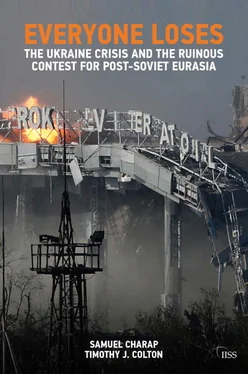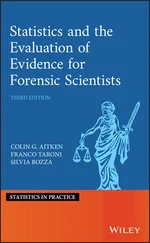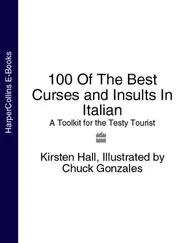Quoted in ‘Chto bylo na nedele’, Kommersant , 6 March 1993.
For an early assessment, see Fiona Hill and Pamela Jewett, ‘“Back in the USSR”: Russia’s Intervention in the Internal Affairs of the Former Soviet Republics and the Implications for United States Policy Toward Russia’, Strengthening Democratic Institutions Project, John F. Kennedy School of Government, Harvard University, January 1994, http://belfercenter.hks.harvard.edu/files/Back%20in%20the%20USSR%201994.pdf.
Christoph Zürcher, The Post-Soviet Wars: Rebellion, Ethnic Conflict, and Nationhood in the Caucasus (New York: New York University Press, 2007), p. 141.
‘Remarks in a Town Meeting with Russian Citizens in Moscow’, 14 January 1994, https://www.gpo.gov/fdsys/pkg/WCPD-1994-01-24/pdf/WCPD-1994-01-24-Pg67.pdf.
For details on activities in Transnistria, see Rebecca Chamberlain-Creanga and Lyndon K. Allin, ‘Acquiring Assets, Debts, and Citizens: Russia and the Micro-Foundations of Transnistria’s Stalemated Conflict’, Demokratizatsiya: The Journal of Post-Soviet Democratization , vol. 18, no. 4, Fall 2010, pp. 329–56.
Daniel W. Drezner, The Sanctions Paradox: Economic Statecraft and International Relations (Cambridge: Cambridge University Press, 1999), pp. 131–248. See also Margarita Balmaceda, ‘Gas, Oil, and Linkages between Domestic and Foreign Policies: The Case of Ukraine’, Europe – Asia Studies , vol. 50, no. 2, March 1998, pp. 257–86; Tor Bukkvoll, ‘Off the Cuff Politics—Explaining Russia’s Lack of a Ukraine Strategy’, Europe – Asia Studies , vol. 53, no. 8, December 2001, pp. 1141–57; Margarita Balmaceda, Politics of Energy Dependency: Ukraine, Belarus, and Lithuania Between Domestic Oligarchs and Russian Pressure (Toronto: University of Toronto Press, 2013).
John P. Willerton and Mikhail A. Beznosov, ‘Russia’s Pursuit of Its Eurasian Security Interests: Weighing the CIS and Alternative Bilateral–Muiltilateral Arrangemnets’, in Katlijn Malfliet, Lien Verpoest and Evgeny Vinokurov (eds), The CIS, the EU and Russia: The Challenges of Integration (Basingstoke: Palgrave Macmillan, 2007), p. 50.
Taras Kuzio, ‘Geopolitical Pluralism in the CIS: The emergence of GUUAM’, European Security , vol. 9, no. 2, Summer 2000, p. 84.
Russia and Belarus further muddied the picture by forming a mostly fictional ‘union state’ in 1997.
The Ukrainians inserted a clause into the 2003 agreement specifying that the new entity was not to act contrary to their constitution or to the objective of fostering integration with the European Union.
Uzbekistan, an original party to the treaty (which was signed in its capital city), withdrew from it in 1999, as did Azerbaijan and Georgia, which had joined in 1993. Uzbekistan was to rejoin in 2006, only to pull out again in 2012.
Martha Brill Olcott, Anders Aslund and Sherman W. Garnett, Getting It Wrong: Regional Cooperation and the Commonwealth of Independent States (Washington DC: Carnegie Endowment for International Peace, 1999), pp. 95–6.
The eight working groups, for example, largely limited themselves to one annual meeting each, often on the margins of larger gatherings. A number of agreements were never implemented, and others went into effect in only one or several of the member states. Details on the GUAM organisation can be found at http://guam-organization.org/and more lucidly at a site maintained by one of the GUAM principals, Moldova: http://www.mfa.gov.md/about-guam-en/.
Olcott, Aslund and Garnett, Getting It Wrong , p. 208.
Jakob Tolstrup, Russia vs. the EU: The Competition for Influence in Post-Soviet States (Boulder, CO: Lynne Rienner, 2013), p. 130.
Authors’ interview with a former senior Russian official, December 2015.
For Brzezinski’s initial statement to this effect, see Zbigniew Brzezinski, ‘The Premature Partnership’, Foreign Affairs , vol. 73, no. 2, March–April 1994, pp. 67–82.
Warren Christopher, ‘NATO PLUS’, Washington Post , 9 January 1994, https://www.washingtonpost.com/archive/opinions/1994/01/09/nato-plus/88b3d1a6-8111-4491-bbf0-e6267b0dae95/?utm_term=.0fe94b86f2ed.
William H. Hill, Russia, the Near Abroad, and the West: Lessons from the Moldova – Transdniestria Conflict (Washington DC: Woodrow Wilson Center Press, 2012), p. 36.
Ronald Asmus of the RAND Corporation, who would shortly join the Clinton administration, wrote with two fellow enlargement advocates in 1995 that for the time being, ‘The West would prefer to have a Finlandised Ukraine – politically and economically stable and pro-Western, but militarily neutral’. Ronald D. Asmus, Richard L. Kugler and F. Stephen Larrabee, ‘NATO Expansion: The Next Steps’, Survival: Global Politics and Strategy , vol. 37, no. 1, Spring 1995, pp. 7–33.
Primakov, Vstrechi na perekrestkakh , p. 371.
Steve LeVine, The Oil and the Glory: The Pursuit of Empire and Fortune on the Caspian Sea (New York: Random House, 2007), p. 215.
Ibid. , p. 221. Russian calculations are well laid out in Douglas W. Blum, ‘The Russian–Georgian Crisis and Baku–Tbilisi–Ceyhan’, PONARS Policy Memo, no. 252, October 2002, http://www.ponarseurasia.org/sites/default/files/policy-memos-pdf/pm_0252.pdf.
Mark Kramer, ‘Ukraine, Russia, and US Policy’, PONARS Policy Memo, no. 91, April 2001, https://www.gwu.edu/~ieresgwu/assets/docs/ponars/pm_0191.pdf.
James Goldgeier and Michael McFaul, Power and Purpose: U.S. Policy toward Russia After the Cold War (Washington DC: Brookings Institution Press, 2003), p. 118.
‘BBC Breakfast with Frost, Interview: Vladimir Putin’, 5 March 2000, http://news.bbc.co.uk/hi/english/static/audio_video/programmes/breakfast_with_frost/transcripts/putin5.mar.txt.
Robyn Dixon, ‘With NATO Chief’s Visit to Russia, a Thaw Begins’, Los Angeles Times , 17 February 2000, http://articles.latimes.com/2000/feb/17/news/mn-65412.
Authors’ interview with a former senior Russian official, May 2016.
Hill, Russia, the Near Abroad, and the West , p. 39.
Online records note expenditures on GUAM/GUUAM in fiscal years 2001 and 2002, without giving exact numbers. There is no annotation for 2003, but in fiscal year 2004 there are entries of US$250,000 through Department of State accounts and US$520,000 through the Department of Homeland Security. The 2002 framework agreement can be found at http://guam-organization.org/en/node/461.
Hill, Russia, the Near Abroad, and the West , p. xii.
‘Vystuplenie na konferentsii Memorial’nogo fonda Dzhavakharlala Neru’, 3 December 2004, http://kremlin.ru/events/president/transcripts/22720.
Читать дальше











